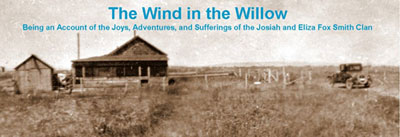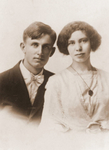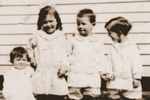 |
|||||
|
|||||
Harry William Smith |
|||||
 |
|||||
Maryon White's Memories of her Uncle Harry,
|
Harry was the fourth child of Josiah and Eliza Smith, and must have been born about 1892 or 93. From all accounts, he was a born rebel. It seems that every time I mentioned his name, the person I was talking to would shake his/her head and sign, "Oh that Harry!" And yet, I recall only one incident (related by several different sources) that confirms his rather odd behavior. Eliza had carefully nurtured some tomato plants (raised from seed) and one day told Harry that he had to set them out before he could go play. In an incredibly short time she spied him running down the road, and, when she went out to the garden to check, she discovered that he had disposed of the whole bunch of plants by carefully burying them upside down in individual "graves." The foliage part was neatly and thoroughly covered with dirt and the tender little roots stuck up to the sun! No one could remember what happened after that. The only incident(s) I know about, again related by several of his siblings, was his delight in tormenting younger brother Bryan at the supper table. Now, I just can't imagine my Uncle Bryan crying, but I can imagine a hungry little boy crying because big brother Harry always managed to take all the crisply fried potatoes, his favorite piece of chicken or the best biscuit on the plate. I can't imagine why Harry got by with this, but my theory is that he just may have been his mother's pet. I think Harry most closely resembled his father, and I've already mentioned that Eliza really did love Josiah despite their stormy life together. I still have Eliza's Bible and the two things she kept in it were a picture of my brother, Donald and a pressed flower in an envelope labeled "from Harry's grave." Harry must have married at quite an early age, because he and his wife were up at Wright, Minnesota when some of the Smith family went up there to live. My mother [Twyla] was school age which sets the time around 1911. Harry had married a girl named Bess Luckhart (spelling probably incorrect.) Just as I told you that I never heard an unkind work about Elmer's Emma, I must say that I never heard a kind work about Bess. There is a big gap in my knowledge about this branch of the family until the early '30s. By then, and probably much earlier, they had moved to Omaha and settled there, perhaps to be near Elmer and his family. They had an enormous family (I think Lee told me there were 12 kids), and apparently had a very difficult time managing financially. I'm sure Elmer and Emma helped as much as they could, as did the other brothers and sisters. I remember one story about the sisters and sisters-in-law collecting as many children's clothes, towels sheets and blankets as they could to give to Bess. They later learned that she said "If these things aren't good enough for them, they aren't good enough for me!" and proceeded to tear them up for rags. |
||||
|
I remember going to visit Harry and his family just once. It must have been about 1934 or 35 when Mother, Donald and I were living with the Larsons. The three of us, plus Gus, Raymond and Twyla Mae went to visit. Before we got there, we stopped somewhere and were fed and watered and then sent to the potty. Then we were firmly instructed not to get too close to Uncle Harry (because he was sick and shouldn't be bothered by little kids). And we were not to eat or drink anything if it was offered nor ask to use their bathroom. We had barely landed when Twyla Mae said "I want a drink of water!" I don't remember a thing about the house or the other people, but I do remember that very, very skinny man lying on a sofa or cot in the living room. My only other memory of visiting someone "on the horizontal" was visiting Aunt Grace so it was a sober and scary time for me. After Harry and several of the children died, Bess took the rest of the family to California. There was some kind of story about city or state health officials threatening to take the surviving children and put them in an institution, but perhaps I made this up. Maybe Lee or someone can clarify this point. When Bess arrived in California she did contact Elmer and [his daughter] Hazel. I don't know if she expected them to care for her and the children or not, but Elmer and Hazel had their hands full caring for their own family. I think they gradually drifted apart, and I don't know if any of Harry's family survived. If so, we may have some distant cousins we don't even know. I don't have any pictures or any further information to relay. I hope Lee will add to this account, and surely Ethel can tell us more if she feels up to it. |
 Harry and Bess in front of their home in Wright, Minnesota |
|||
Bill Smith's Memories of his Uncle Harry, Vashon, Washington, January 13, 1992
|
There are several stories of Uncle Harry that I got from my father, Bryan, which I will relate. Perhaps [my brother] Jack can correct them as needed. I don't remember Uncle Harry or Aunt Bess, although I have photos of them. Uncle Harry looked very much like [Ethel's son] John Taylor. The Quilt of Three Feathers: Uncle Elmer, Uncle Harry and Dad (Bryan) slept together at the house in Chariton, Iowa. Dad was less than 12 years during that period. They had one blanket, which had only three feathers in it. Harry took two of the feathers, Uncle Elmer got one and Dad didn't get any. Dad always shuddered when it got cold from that memory. Nxxxxx Ned: Shooting with a 22 Rifle: Harry and Dad had a 22 rifle. They used it to shoot at a person in a field about a mile from them. Of course, at that range, it would have been inaccurate, but quite harassing to anyone being shot at--a kid thrill trick. Another story for which I have lost the details concerned Harry shooting a cigarette out of a man's mouth with a 22 rifle. Sweet Revenge: Harry was slim and never very large. When he was in his early teens, he had a confrontation at Chariton, Iowa with a grown man. Knowing that he couldn't whip him, Harry told that man that when he (Harry) grew up he would find him and whip him. Many years later when they lived at Red Oak, Iowa and Harry was in his late teens, he went back to Chariton and found that man and beat him up badly. I asked Dad why their father (Josiah) didn't control Harry. Dad said that he thought that after Harry got any size that their father was afraid of him. Although Harry was 5 years older than Dad, they apparently went around a lot together when they were kids. When you were with Harry you enjoyed safe conduct through the neighborhood gangs at Chariton, Iowa. So there was sort of a bond between them, although Dad really didn't like Harry and was afraid of him. In those days tuberculosis had no cure, and Bess made matters worse by going to a doctor that encouraged them to take creosote for it. The only members of the family that survived the tuberculosis were Bess and a daughter named Azalea. When I visited at Red Oak about 1979 or 80, I found some of the Lockharts who remembered Bess very well, but did not know where she was. |
|
|||
| Ethel Taylor's Memories of her brother, Harry, 1992 | As children, Harry was ten years older than I and he was really good to me. He was small and very quiet. He was a good worker and often brought in quite a bit of money. I think he was Dad's favorite as he helped lay shingles a lot as Dad was a carpenter. Mother was a very strong woman and she whipped Harry a lot and that meant a beating. I used to go upstairs and plug my ears. She beat so hard and would not cry. It was usually because he had made Bryan cry about something. My Dad was never home when this occurred. Harry brought me my first long coat when I went to High School. He married a nice good looking girl, Bess Luckhart, from Red Oak, Iowa. They were both too young, but he got a job as brakeman on train in Rock Springs, Wyoming, but quit and went to Minnesota as Dad wanted him to help with timber. They built a small house and had two or more children. He then moved to Omaha, Nebraska and had more family. He lived in a house that hadn't been fumigated and contacted TB which was very popular those days. He insisted the doctor keep it quiet so he lived for a few years. When Mother learned he was gone (she was in Wyoming) she cried so hard and said so many times she wished she hadn't beat him so bad. Most of his family contacted the same TB, but Bess was not listed as a carrier. She moved often in order to stay shy of the doctors. She finally landed in Tucson, Arizona. I wrote to her several times, but at that time, I think she only had 2 of the children left. Too bad I didn't go see her, but we drifted apart and I lost track of her. Going back I failed to say I visited them in Omaha in 1925 or 1926. He was working and I was only there a day and night, but they were doing good and I had a wonderful visit. That was the last time I saw either one of them. At that time they had a good family, 2 boys, 3 girls and a little one Azalea. |
|
|||
| Lillian Smith's Memories of her Brother-in-law, Harry, January 26, 1992 | I have very little knowledge of the Harry Smith family. I think I was told of the family buying some used mattresses and I guess those days they were sold as is, and several contacted typhoid.
|
||||
|
|||||
|
©Roberta Tuller 2025
|
|||||


